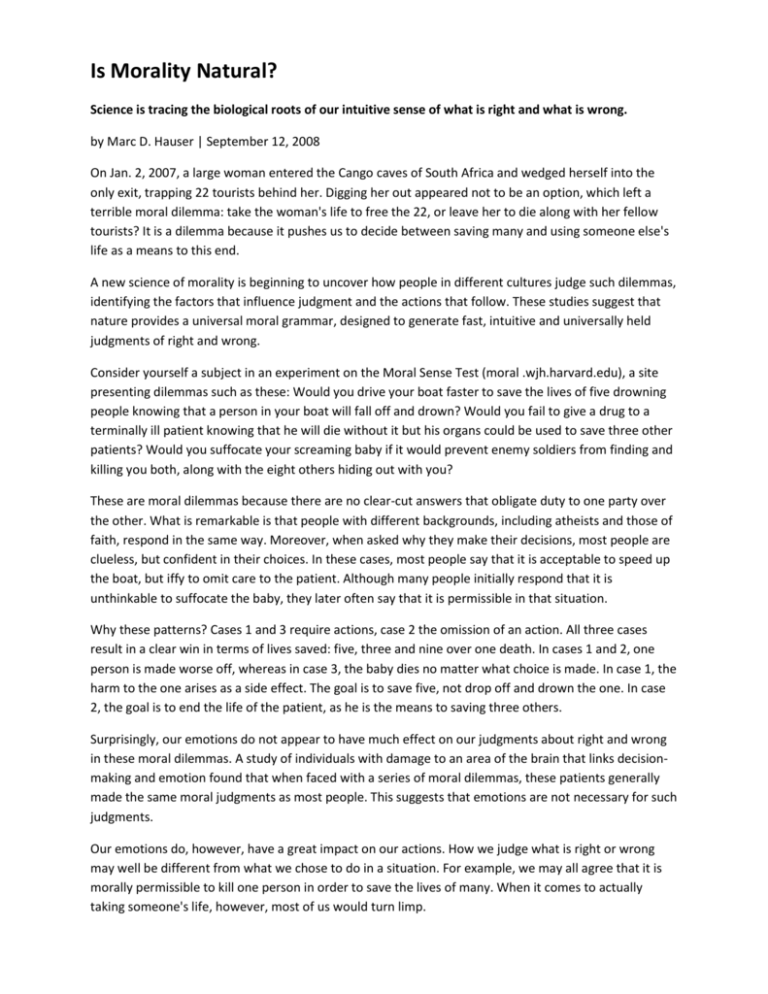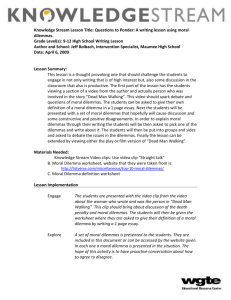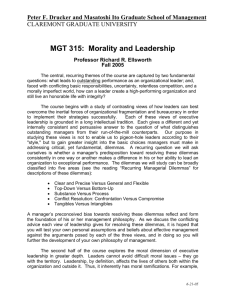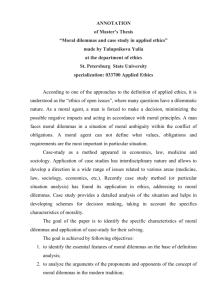Is Morality Natural?
advertisement

Is Morality Natural? Science is tracing the biological roots of our intuitive sense of what is right and what is wrong. by Marc D. Hauser | September 12, 2008 On Jan. 2, 2007, a large woman entered the Cango caves of South Africa and wedged herself into the only exit, trapping 22 tourists behind her. Digging her out appeared not to be an option, which left a terrible moral dilemma: take the woman's life to free the 22, or leave her to die along with her fellow tourists? It is a dilemma because it pushes us to decide between saving many and using someone else's life as a means to this end. A new science of morality is beginning to uncover how people in different cultures judge such dilemmas, identifying the factors that influence judgment and the actions that follow. These studies suggest that nature provides a universal moral grammar, designed to generate fast, intuitive and universally held judgments of right and wrong. Consider yourself a subject in an experiment on the Moral Sense Test (moral .wjh.harvard.edu), a site presenting dilemmas such as these: Would you drive your boat faster to save the lives of five drowning people knowing that a person in your boat will fall off and drown? Would you fail to give a drug to a terminally ill patient knowing that he will die without it but his organs could be used to save three other patients? Would you suffocate your screaming baby if it would prevent enemy soldiers from finding and killing you both, along with the eight others hiding out with you? These are moral dilemmas because there are no clear-cut answers that obligate duty to one party over the other. What is remarkable is that people with different backgrounds, including atheists and those of faith, respond in the same way. Moreover, when asked why they make their decisions, most people are clueless, but confident in their choices. In these cases, most people say that it is acceptable to speed up the boat, but iffy to omit care to the patient. Although many people initially respond that it is unthinkable to suffocate the baby, they later often say that it is permissible in that situation. Why these patterns? Cases 1 and 3 require actions, case 2 the omission of an action. All three cases result in a clear win in terms of lives saved: five, three and nine over one death. In cases 1 and 2, one person is made worse off, whereas in case 3, the baby dies no matter what choice is made. In case 1, the harm to the one arises as a side effect. The goal is to save five, not drop off and drown the one. In case 2, the goal is to end the life of the patient, as he is the means to saving three others. Surprisingly, our emotions do not appear to have much effect on our judgments about right and wrong in these moral dilemmas. A study of individuals with damage to an area of the brain that links decisionmaking and emotion found that when faced with a series of moral dilemmas, these patients generally made the same moral judgments as most people. This suggests that emotions are not necessary for such judgments. Our emotions do, however, have a great impact on our actions. How we judge what is right or wrong may well be different from what we chose to do in a situation. For example, we may all agree that it is morally permissible to kill one person in order to save the lives of many. When it comes to actually taking someone's life, however, most of us would turn limp. Another example of the role that emotions have on our actions comes from recent studies of psychopaths. Take the villains portrayed by Heath Ledger and Javier Bardem, respectively, in "The Dark Knight" and "No Country for Old Men." Do such psychopathic killers know right from wrong? New, preliminary studies suggest that clinically diagnosed psychopaths do recognize right from wrong, as evidenced by their responses to moral dilemmas. What is different is their behavior. While all of us can become angry and have violent thoughts, our emotions typically restrain our violent tendencies. In contrast, psychopaths are free of such emotional restraints. They act violently even though they know it is wrong because they are without remorse, guilt or shame. These studies suggest that nature handed us a moral grammar that fuels our intuitive judgments of right and wrong. Emotions play their strongest role in influencing our actions—reinforcing acts of virtue and punishing acts of vice. We generally do not commit wrong acts because we recognize that they are wrong and because we do not want to pay the emotional price of doing something we perceive as wrong. So, would you have killed the large woman stuck in the cave or allowed her to die with the others? If you are like other subjects taking the moral sense test, you would say that it is permissible to take her life because you don't make her worse off. But could you really do it? Fortunately, there was a simpler solution: she was popped out with paraffin after 10 hours.











